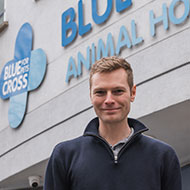Kopper with his owners, Matt and Heather Thompson of Maryville, Tennessee.
Trial evaluates new procedure to treat prostate cancer in dogs
A clinical trial to evaluate a new procedure for treating prostate cancer in dogs is proving to be a success.
Led by Dr Bill Culp at the UC Davis Veterinary Medical Teaching Hospital, California, the trial has been performed on six dogs so far, and early results have been promising.
The treatment is similar to a procedure in human medicine that has taken hold in the past few years for treatment of non-cancerous prostate enlargement.
Known as prostatic transarterial embolization, the treatment is emerging as a minimally invasive alternative to other prostate cancer therapies.
The procedure uses MRI and CT scans to access the prostate tumour and associated blood supply. Once the blood supply is mapped, the tumour is accessed using interventional radiology techniques, utilising fluoroscopic guidance (real time "x-rays").
Catheters are placed and the blood supply to the tumour is identified. Material is then injected into the blood vessels supplying the tumour, causing a blockage and cutting off the blood supply to the tumour. The size of the gland and tumour decrease as cells die from lack of blood.
One recipient of Dr Culp's procedure is Kopper, a 14-year-old Belgian Malinois from Tennessee.
Kopper, a retired K-9 officer, was brought to the University of Tennessee's veterinary hospital last year for treament of a paralysed larynx and megaesophagus. While at the hospital, his prostate issues were discovered. Luckily the vets there were aware of Dr. Culp's clinical trial, and referred his Kopper's owners to UC Davis for the treatement.
Dr Kulp assessed Kopper's tumour using CT and MRI images which showed signs consistent with a cancerous prismatic carcinoma. The images also showed appropriate vasculature for the embolization procedure, meaning that Kopper was a good candidate for the procedure.
Together with a colleague who performs similar procedures in humans, Dr Culp successfully performed Kopper's procedure.
Kopper returned to Tennesse within a few days and, to date, his prostate has reduced in size. The hope for Kopper and all dogs undergoing this treatment, is that a decrease in tumour size will improve the qaulity and length of life for dogs with prostate cancer.
UC Davis say that the clinical trial is ongoing and the recruitment of more dogs with naturally occurring prostate cancer is needed to help evaluate the effectiveness of the treatment as an accepted standard-of-care procedure.
Image (C) UC Davis Veterinary Medicine







 The latest
The latest 
